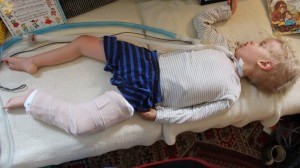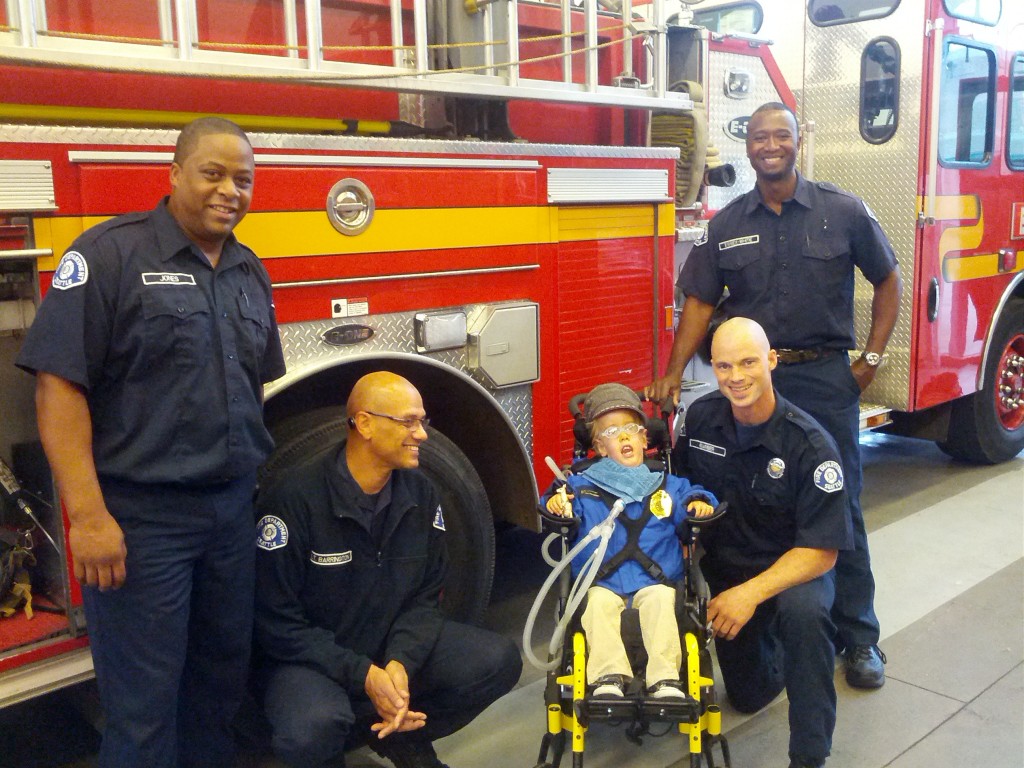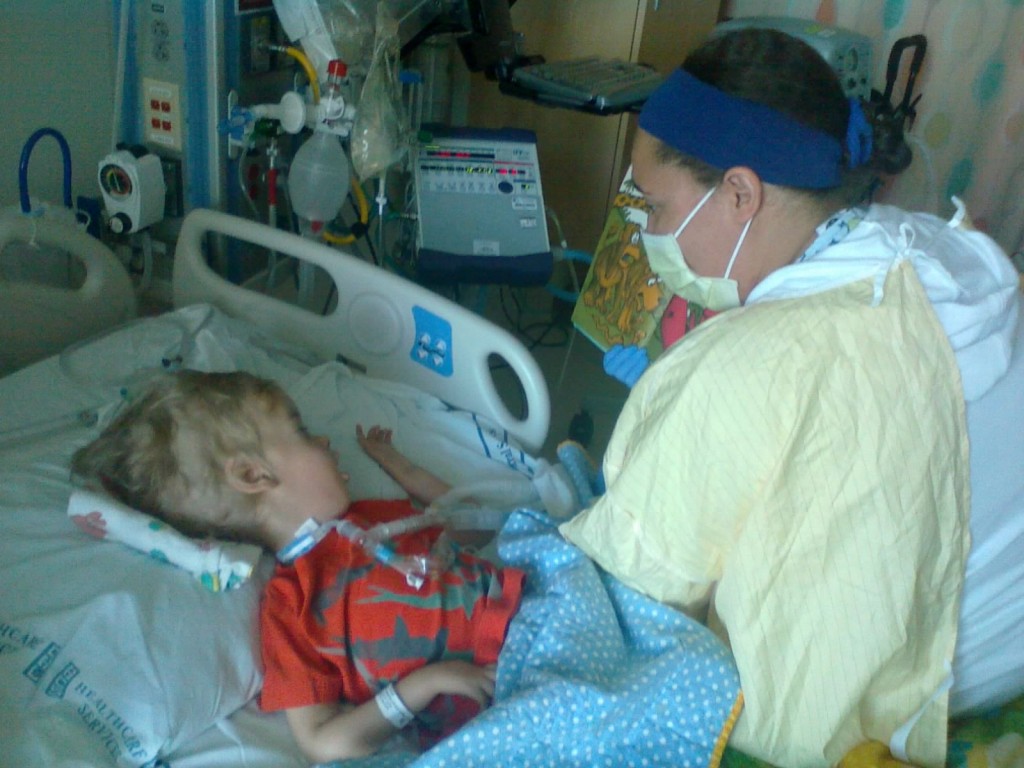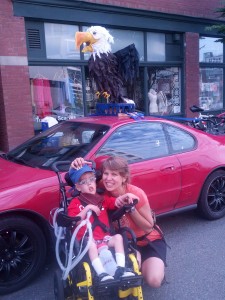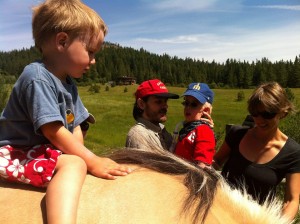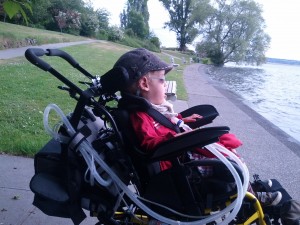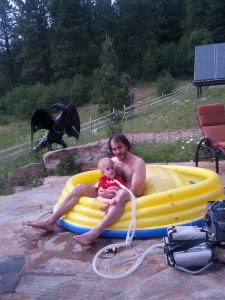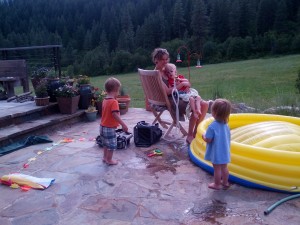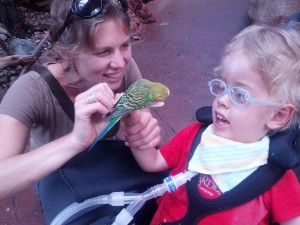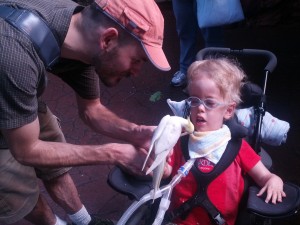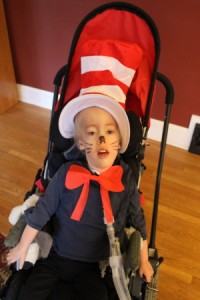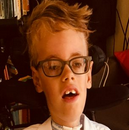On Saturday “Reptile Man” came to our neighborhood community center and showed off his animals to nearly 100 awe-struck little kids (plus their parents). We ran into neighbors who have a 2 1/2 year old, Mari, who also uses a wheelchair, so she and Lucas sat in the front row. The whole production was right up Lucas’s alley — Reptile Man gave all sorts of fun facts about animals (ie: boa constrictors can’t actually swallow humans) and shared the kids general awe of snakes and lizards. Each time he brought out a new animal to show the audience, Reptile Man made sure to hold them extra close up for Lucas and Mari. It was very exciting, and Lucas today is still beaming when he says “you touched the snake!” (“you” meaning himself.)
and showed off his animals to nearly 100 awe-struck little kids (plus their parents). We ran into neighbors who have a 2 1/2 year old, Mari, who also uses a wheelchair, so she and Lucas sat in the front row. The whole production was right up Lucas’s alley — Reptile Man gave all sorts of fun facts about animals (ie: boa constrictors can’t actually swallow humans) and shared the kids general awe of snakes and lizards. Each time he brought out a new animal to show the audience, Reptile Man made sure to hold them extra close up for Lucas and Mari. It was very exciting, and Lucas today is still beaming when he says “you touched the snake!” (“you” meaning himself.)
 A few months ago we tried to get Lucas interested in a large lizard that was on display at an outdoor festival, and Lucas absolutely freaked out at the suggestion that he touch it. So it was nice to see him being so adventurous with Reptile Man. He gave the tortoise lots of pats, touched an alligator and a small snake. The only one he wouldn’t touch was the extra large viper snake, which wouldn’t stop flicking its tongue at him.
A few months ago we tried to get Lucas interested in a large lizard that was on display at an outdoor festival, and Lucas absolutely freaked out at the suggestion that he touch it. So it was nice to see him being so adventurous with Reptile Man. He gave the tortoise lots of pats, touched an alligator and a small snake. The only one he wouldn’t touch was the extra large viper snake, which wouldn’t stop flicking its tongue at him.
At school this past week Lucas started practicing driving on a new loaner power chair, and that seems to be going OK. But it’s still physically hard for him to steer, and he gets frustrated when he wants to go forward but can’t. We can’t help but wish for even better technology so this would be easier for him – a lighter chair, a more sensitive steering devise, the perfect head rest. But it seems like maybe he’s got close to the best possible chair setup that exists now, so we’re hoping we can find the right hand position to make it work. And ultimately learning to drive a power chair might just end up being more difficult for Lucas than we thought it would be.
The other big adventure last week was the addition of even more experts to Team Lucas, which meant a long, long morning at Children’s Hospital. We started our day meeting a nurse practitioner in the neurosurgery department. Neurosurgeons follow Lucas because of his hydrocephalus (extra fluid in his ventricles) which has been steady since his first days of life, but the fact that he has such large ventricles tends to worry doctors — especially doctors who have only gotten to know Lucas via his CT and MRI images. The nurse came into the room ready to run through a battery of tests, but thankfully she spent some time getting to know Lucas (who was mostly chanting “more books!”), and determined that he was not showing clinical signs of excess pressure on his brain. So for now we’re off the hook – she, like our docs in DC, was convinced he is doing well without brain surgery. And of course we like doctors who subscribe to the “don’t fix it if it ain’t broken” philosophy, so we were happy about that new team member.
Next up was the new Physical Medicine doctor who we’d heard good things about, but Dr. Apkon proved to be even better than expected. In medical hierarchy, physical medicine doctors oversee therapists — physical, occupational, speech, etc. In DC the one we saw most of the time seemed to interpret her role as rubber stamping whatever our therapists were already doing. Our visits often felt like a wasted trip because the most she interacted with Lucas was checking his ankle flexion. (Which, needless to say, has not been our topmost priority.)
But our new doctor was really helpful in thinking through everything that helps Lucas be independent/interactive in the world: power chairs, wheelchairs, standers, bath chairs, etc. She showed us pictures of presentations she’s give to SMA families (a muscle disease that has some similarities to MTM), describing new contraptions that might enable Lucas to move his arms more. She also talked us through the physiology of a growing kid’s body that does not bear weight, about things we can do now to help Lucas in the long run (turns out ankle flexion will be important…) The development of our bodies is built on the assumption that we are upright and our bones are weight-bearing, so we talked about the fact that Lucas’s bones will likely never calcify like other kids, making him prone to fractures. She also described the anatomy of a developing hip socket, and told us about better positioning to help Lucas’s hip socket develop, minimizing the risk of the bone popping out of the joint. And of course, like all our favorite doctors, she actually spent time talking to Lucas — about books, stickers and all the other important things doctors should talk to their toddler patients about.
Our last MD visit of the day was with our neurologist. Lucas was exhausted and ready, as he said over and over, to GET IN THE VAN AND GO HOME. Lucas can be quite clear about being done, so he turned that final appointment into a quick affair. In a few minutes we decided to go up to a full dose of the medicine Lucas is taking experimentally for muscle tone to see if it helps.
On our way out our very favorite nurse at Children’s stopped by to say hi. She coaches the US Paralympic swim team, so gave us a brief report while checking in with Lucas about penguins. And then in the hall on the way to get our flu shots we ran into both of Lucas’s respiratory therapists, and they were both excited to see Lucas so we couldn’t just rush off. (These are the times I’m sure Lucas wishes he had a power chair — so he could just keep rolling towards the door.)
And then we were in the van, and Lucas was asleep before we were even half way through Mister Rabbit. And grateful for the great team of docs we’re getting to know here.
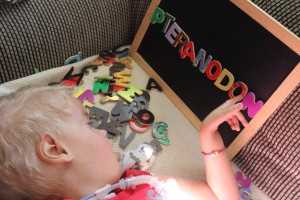 couch to bed. And the down time seems to have paid off! Last Friday we finally got him back up in his chair and went in to get another x-ray. The doctor was very pleased with the progress — he even showed Lucas the images, and the healing was visible and obvious. Just as significantly for us, Lucas showed no signs of pain the whole time which was a huge contrast to the previous trip to the hospital. So the doctor gave the go-ahead for a return to kindergarten, at least for partial days.
couch to bed. And the down time seems to have paid off! Last Friday we finally got him back up in his chair and went in to get another x-ray. The doctor was very pleased with the progress — he even showed Lucas the images, and the healing was visible and obvious. Just as significantly for us, Lucas showed no signs of pain the whole time which was a huge contrast to the previous trip to the hospital. So the doctor gave the go-ahead for a return to kindergarten, at least for partial days.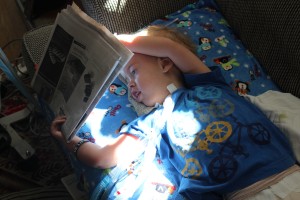
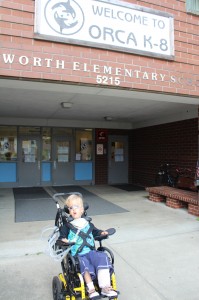
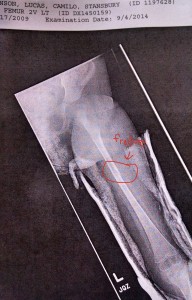
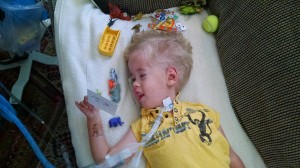
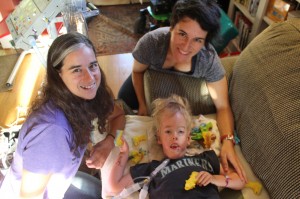
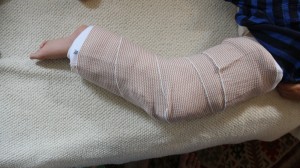 She laid him back down on the couch, and after a bit he was consoled. Later she tried moving him again and the same thing happened.
She laid him back down on the couch, and after a bit he was consoled. Later she tried moving him again and the same thing happened.